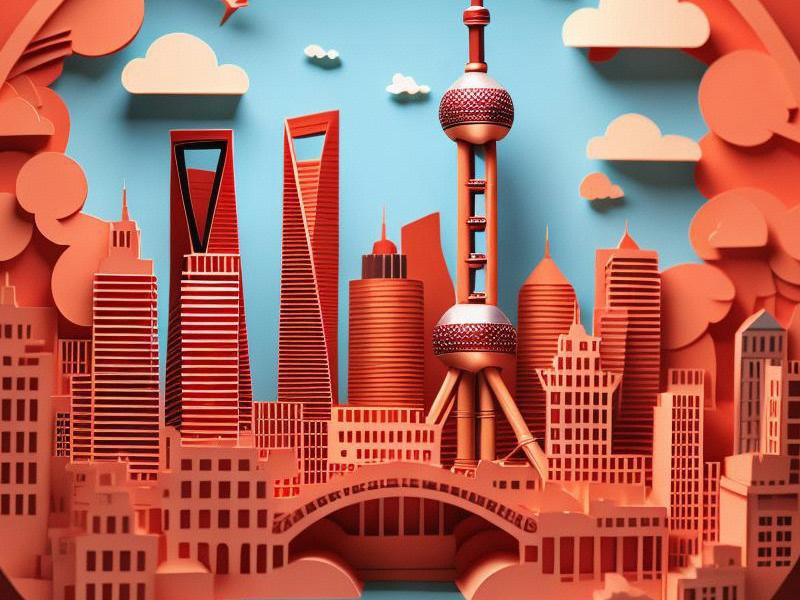
Shanghai, often referred to as the "Pearl of the Orient," stands as a testament to China's rapid urbanization and economic rise. This vibrant city, with its stunning skyline and rich cultural tapestry, has evolved from a modest fishing village into a global financial hub and cultural powerhouse.
Historically, Shanghai's strategic location along the Yangtze River Delta made it a natural center for trade and commerce. During the 19th century, the city became a treaty port, opening its doors to foreign influence and investment. This period saw the construction of iconic buildings such as the Bund, a waterfront promenade lined with colonial-era architecture, which remains a symbol of Shanghai's cosmopolitan past.
In the 20th century, Shanghai experienced dramatic changes, particularly during the Chinese Civil War and the establishment of the People's Republic of China in 1949. Despite these upheavals, the city managed to maintain its position as a key player in China's economy. The economic reforms initiated in the late 1970s under Deng Xiaoping marked a new era for Shanghai, propelling it onto the world stage.
Today, Shanghai is a global metropolis that seamlessly blends tradition with modernity. The city's skyline is dominated by futuristic skyscrapers such as the Shanghai Tower, the tallest building in China and the second-tallest in the world. These architectural marvels stand in stark contrast to the historic districts like the French Concession and the Old City, where visitors can still glimpse the city's colonial past.
上海龙凤419 Shanghai's economic transformation is nothing short of extraordinary. As the financial capital of China, it is home to the Shanghai Stock Exchange, one of the largest in the world. The city's port, the Port of Shanghai, is the busiest container port globally, underscoring its importance in global trade. Moreover, Shanghai has become a hub for multinational corporations, with many of the world's leading firms establishing their regional headquarters there.
The city's cultural scene is equally vibrant. Shanghai is renowned for its art galleries, theaters, and music venues, which showcase a blend of traditional Chinese and international influences. The city hosts numerous cultural festivals throughout the year, including the Shanghai International Film Festival and the Shanghai Fashion Week, attracting visitors from around the globe.
Shanghai's commitment to innovation is evident in its thriving technology sector. The city is a leader in artificial intelligence, fintech, and other emerging technologies. The Zhangjiang Hi-Tech Park, often referred to as "China's Silicon Valley," is home to numerous startups and research institutions driving technological advancements.
Despite its rapid development, Shanghai has not overlooked the importance of sustainability. The city has implemented various initiatives to reduce pollution and promote green energy. The Bund's transformation into a pedestrian-friendly area with eco-friendly infrastructure is a prime example of Shanghai's efforts to balance urban growth with environmental considerations.
上海夜网论坛 Shanghai's transportation network is another aspect of its transformation that deserves attention. The city boasts an extensive metro system, which is one of the most efficient and widely used in the world. Additionally, the Maglev train, which connects Shanghai Pudong International Airport to the city center, is a testament to the city's commitment to cutting-edge transportation solutions.
Education is a cornerstone of Shanghai's development, with the city being home to some of the best universities in China. Fudan University and Tongji University are among the prestigious institutions that attract students and researchers from across the globe. These academic hubs play a crucial role in fostering innovation and advancing knowledge in various fields.
Shanghai's transformation is not without its challenges. The rapid urbanization has led to issues such as housing shortages and traffic congestion. However, the city government has been proactive in addressing these concerns through urban planning and infrastructure development. Initiatives like the construction of new satellite cities and the expansion of public transportation are aimed at alleviating the pressures of urban growth.
上海品茶工作室 The people of Shanghai are a significant part of the city's transformation. The cosmopolitan nature of the city has created a diverse population that contributes to its cultural and economic vibrancy. Shanghai's residents are known for their entrepreneurial spirit and adaptability, qualities that have been instrumental in the city's success.
Shanghai's role in global affairs is also noteworthy. As a member of the World Expo Organizing Committee, the city successfully hosted the World Expo in 2010, an event that showcased China's development and its commitment to sustainability. The Expo left a lasting legacy, with the transformation of the Expo site into the China Art Museum and the Shanghai Corporate Pavilion area into the Shanghai Expo Park.
Looking ahead, Shanghai continues to chart its course as a global leader. The city's vision for the future includes further advancements in technology, sustainable urban development, and cultural exchange. Shanghai aims to strengthen its position as a hub for innovation and a model for sustainable urban living.
In conclusion, Shanghai's transformation is a story of resilience, adaptability, and innovation. From its historical roots to its modern-day status as a global metropolis, the city has demonstrated an unparalleled ability to embrace change while preserving its rich cultural heritage. As Shanghai continues to evolve, it remains a beacon of hope and opportunity, inspiring cities around the world to pursue their own paths of progress and prosperity.
